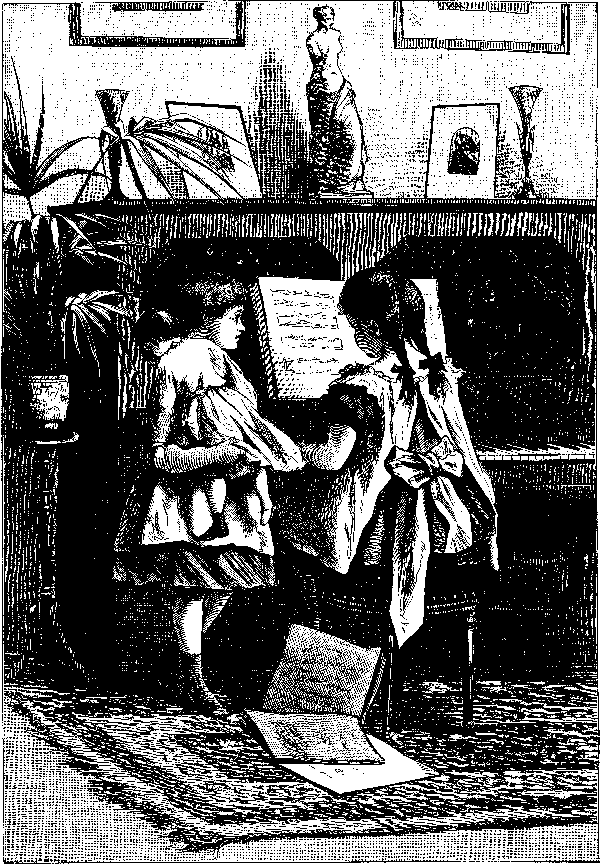
The Project Gutenberg EBook of The Nursery, Number 164, by Various
This eBook is for the use of anyone anywhere at no cost and with
almost no restrictions whatsoever. You may copy it, give it away or
re-use it under the terms of the Project Gutenberg License included
with this eBook or online at www.gutenberg.org
Title: The Nursery, Number 164
A Monthly Magazine for Youngest Readers
Author: Various
Release Date: May 28, 2005 [EBook #15928]
Language: English
Character set encoding: ASCII
*** START OF THIS PROJECT GUTENBERG EBOOK THE NURSERY, NUMBER 164 ***
Produced by Juliet Sutherland, Bruce Thomas and the Online
Distributed Proofreading Team.
| No. 164. | AUGUST, 1880. | Vol. XXVII. |
THENURSERYA Monthly MagazineFOR YOUNGEST READERS.BOSTON,
|
|
| $1.50 a Year, in advance. | A single copy, 15 cents. |
Entered at the Post Office at Boston as Second-Class Matter. |
| Entered according to Act of Congress, in the year 1880. by THE NURSERY PUBLISHING CO., in the Office of the Librarian of Congress at Washington. |
| PAGE | ||
| THE LITTLE TEACHER | By Dora Burnside | 33 |
| THE ANT'S DAIRY | By T.C. | 36 |
| BABY JEAN | By F.E. Hamilton | 37 |
| THE FRIENDLY DOG | By Uncle Charles | 38 |
| CARLO'S BONNET | By B.P. | 40 |
| CHARLEY GOES A-FISHING | By A.B.C. | 42 |
| WHAT WE SAW IN THE WOODS | By Thomas Stafford | 44 |
| BABY READING TO HER MOTHER | By M.D.B. | 46 |
| NOW, AND THEN | By Alice Williams Brotherton | 47 |
| DRAWING-LESSON | By Harrison Weir | 49 |
| THE FISHERMAN'S DAUGHTER | By Alfred Selwyn | 50 |
| JOHNNY AND THE TOAD | By H.A.F. | 52 |
| THE HEN WHO HELPED HERSELF | By L.B. | 54 |
| THE GREAT JOURNEY | By George S. Burleigh | 57 |
| A WOFUL TALE | By Jane Oliver | 59 |
| THE BROKEN KITE | By Ida Fay | 62 |
| SUMMER GAMES | (Music by T. Crampton) | 64 |
| $2.50 | } | { | $2.50 | |
| Per Hundred. | } | CHEAP | { | Per Hundred. |
The third volume of "THE CHILD'S MONTHLY," a magazine which has been used with great success in many primary schools, was completed with its March issue. It is now consolidated with "THE NURSERY," which will embody all its most prominent features. We can supply back numbers of "The Child's Monthly" and "Monthly Reader" at the above low rate.
We call the especial attention of School Committees, Teachers, and others to the opportunity here afforded of obtaining the Choicest and Best Illustrated Reading-Matter at a trifling expense. Each number contains 16 pages, printed in large type on fine tinted paper. Send stamp for a specimen copy. Address
THE NURSERY PUBLISHING CO., 36 Bromfield Street, Boston, Mass.

|
Some of the sounds were pleasing to her, and from some she would start and draw back, as if she were hurt. A false note in music seemed to inflict pain, while she would show great pleasure when the harmony was perfect. This little girl, whose name is Laura, has been so faithful in studying the rules of music, that, young as she is, she is employed to teach it to children still younger than herself. As her parents are poor, she is paid well for this service. In the picture you may see her standing, while Emma Dean, one of her little pupils, occupies the music-stool. "Oh, I shall never learn to play like you, Miss Laura," says Emma. "Pray don't call me Miss," says Laura; "for I am but a little girl like yourself." "But then you know so much more than I do, that I like to call you Miss," says Emma. "Are you not my teacher?" "I try to be," says Laura; "but, if we talk instead of work, we shall not make much improvement. Now let me hear you play over this exercise once more." "But I have played it a dozen times," says Emma. "Let us try something new." "You have played it a dozen times; but you must play it two hundred times more, if you expect to be perfect in it," says Laura. "Two hundred times! Oh, I can't think of it," exclaims Emma. "Let us try something new." Here Mrs. Dean, who from a room near by had overheard the conversation, came in, and said, "If you cannot obey your teacher, Emma, you must stop taking music-lessons. Miss Laura is quite right; and I am glad to see that she does not yield to your whims. The best way in learning is always to learn one thing thoroughly before passing to another." Emma gave up the point, and began to play the exercise with a good grace. She did so well, that, when she had played it over thirty times, Miss Laura said to her, "That will do for to-day. We will take it up again in our next lesson. Now we will pass to a new piece." But Mrs. Dean said, "You have done enough to-day, my children. Now go and pick some strawberries for yourselves in the garden, and then we will take a walk in the grove." And this is what they did. |
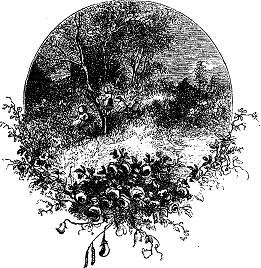 |
|
o ants keep cows? Let us see. A little insect named an aphis is found on the leaf of most every plant. This little parasite lives on the sweet juice called honey-dew. Now the ants are very fond of this honey-dew, and know that they can obtain a supply from the body of the aphis. The ants, therefore, climb up trees on whose leaves the aphides have collected. Then an ant goes close to one of these insects for a drop of the sweet juice. If this be not soon given out, the ant will gently tap the body of the aphis, and thus obtain a supply of the sweet fluid. After feasting on this, the ant will pass to another little aphis and treat it in the same manner for another drop. But the ant has sense enough to treat the aphis as we treat our cows. Our farmers, you know, keep the cows in enclosed meadows, and supply them with hay and turnips when the grass fails. The ants also take a number of aphides close to their nests, and there keep them secure and supply them with suitable food. Now the lady-birds are also fond of the aphides, and eat them up by hundreds. But the ant has sense enough to keep the aphis for a supply of honey-dew instead of killing it as the lady-bird does. Is not the ant, therefore, entitled to be regarded as a cow-keeper, and are not the tiny little aphides his milch-cows? |
|
Eyes as bright as diamonds, Mouth all sweet and clean, Cheeks with tempting dimples; That's my baby Jean! Hands as soft as rose-leaves, Teeth like glistening pearls, Little sunbeams woven On her heads for curls. Little feet that patter Here and everywhere, Little mind that's busy, Filled with childish care. |
Lips from which the kisses Bubble all day long, Tongue that's ever singing Some sweet cradle-song. How I love my baby Words can never tell; And she—she loves papa Just as much and well. She's the dearest fairy That was ever seen; And from Heaven I'm certain Came my baby Jean! | |
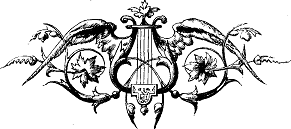
Poor Old Whitey! He fell lame, and was turned out in a little field to starve. And he would have starved, if it hadn't been for Milo.
And who was Milo? He was a dog who had lived in the stable with Old Whitey. They had become great friends. Each had found the other trusty and kind.
And I think Milo must have reasoned in this way: "Is it not sad to see my old friend shut up in that barren little field with nothing to eat? He has nibbled all the grass, and there is nothing left for him. It is too bad; and I can't stand it."
In the cellar of the stable were some turnips and beets. What does Milo do but take a long beet in his mouth, and carry it to Old Whitey, who neighs, as if to say, "Thank you, old friend."
Then he gobbles it up, and looks at Milo, as if to say, "Another, if you please." Milo trots off, and brings him a turnip. Oh, how it does relish! Old Whitey begins to caper, in spite of his lame legs.
Milo kept running to and fro for half an hour, till Old Whitey had made a good dinner. Then the man who had shut up the old horse found out what was going on.
He seized a whip, and ran at Milo to punish him. But it happened that the lady who owned the farm, and who did not know how Old Whitey had been treated, came back from the city just at that time to pass a month in the country.
She saw what was going on, asked what was the matter, and, when she learned it, said to the man, "The dog is a better Christian than you are. He shall stay, and you shall go. Come into the house, and let me pay you your wages."
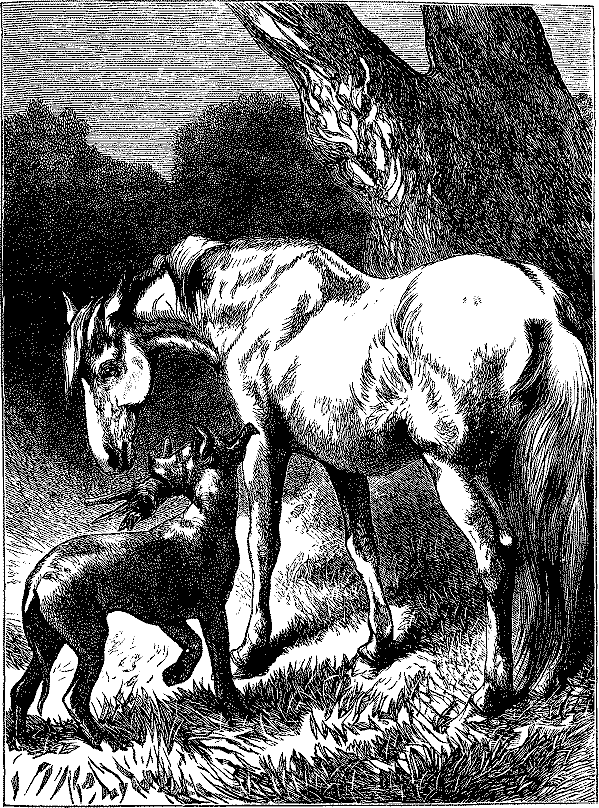
Thenceforth Old Whitey was well taken care of; and, as for Milo, he was petted and praised to his heart's content. Cruelty to animals is an act which no good man or child can he guilty of. I was not sorry to learn that the man who had tried to starve Old Whitey was dismissed from his place.
Of course Carlo was a dog, and I'll tell you how he came to us. As my father was walking up Arch Street, Philadelphia, one day, with his hands clasped behind him, something cold and damp was pushed against his fingers. He turned round quickly, and a beautiful brown-and-white pointer came to his side, and looked up at him with such a pleading look in his soft brown eyes, that my father said, as he patted him on the head, "Poor fellow, are you lost?"
That was enough for Carlo, as we named him. He had found a kind master, and my father a faithful friend. Of course it wouldn't do to keep the dog without trying to find his owner: so the next day he was advertised; and, for several days after, every ring at the bell would make us children start, and feel afraid that somebody had come to take him away. But nobody came for him; and we loved and petted our new-found treasure to the neglect of wooden horses and dolls, and all our other toys.
Sometimes he would come to the parlor-door with his feet very wet and muddy from running through the street-gutters. Then we would say, "O Carlo! what dirty boots!" He would hang down his head, and go off to the back-yard, and lick his feet until they were clean, when, with a bound, and a wag of the tail, he would rush back to the parlor, quite sure that he would be let in.
But the month of June was coming,—a sorrowful time for dogs; for the city had ordered that all dogs found on the streets without muzzles on must be destroyed. At five o'clock every morning, the wagons used to go through the streets, and take up all dogs that were not muzzled. So we had to get a "bonnet," as we called it, for our pet.
It was made of bright red leather, and really he looked so handsome in it, that we thought he ought to like to wear it when he went out for a walk; but he didn't one bit. He used to rub his head on the sidewalk, and fuss and squirm, and, when he didn't get rid of his bonnet in that way, the cunning fellow used to hide it when he got home.
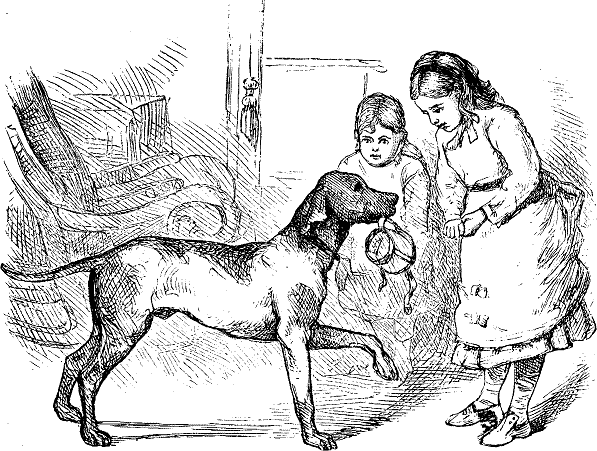
We kept it hung up on a high nail in the dining-room; but one day, when we called Carlo to have his bonnet put on before he went out, there was no bonnet to be found. Who could have taken it? I must say Carlo acted very much like the thief; for he hung his head, and looked sheepish, when we asked him about it.
We hunted under the chairs and the lounge, in the closets, in parlor and dining-room, Carlo fussing round with us, just as if he wanted dreadfully to find it; but it couldn't be found. So we went out, and shut the street-door after us, saying, "Well, Carlo, you can't go out to walk, that's all."
Those who hide know where to find. When Carlo saw, that, without his bonnet, there was no walk for him, he scampered into the basement-kitchen, got out the muzzle from a pile of old papers in one of the closets, carried it up stairs, and laid it down on the dining-room floor.
But this was not the last time Carlo hid his red bonnet and found it again. In all sorts of places he would stow it away when he came in from his walks. And at last he got so used to it that when we said, "Now, Carlo, go fetch your bonnet," he would dash off and pull it from its hiding-place, and quietly stand to have it buckled on.
He behaved so well in the streets, that before the dog-season was over, we used to take his bonnet off, and let him carry it home in his mouth. One rainy day, when the water was pouring down the open gutters, and I was hurrying home, I happened to look round, and there was Carlo coming along behind me; but his pretty red bonnet was bobbing along in the gutter, where the sly rascal had thrown it, hoping, I suppose, that it would be carried down to the Delaware River.
Will Charley go a-fishing? |
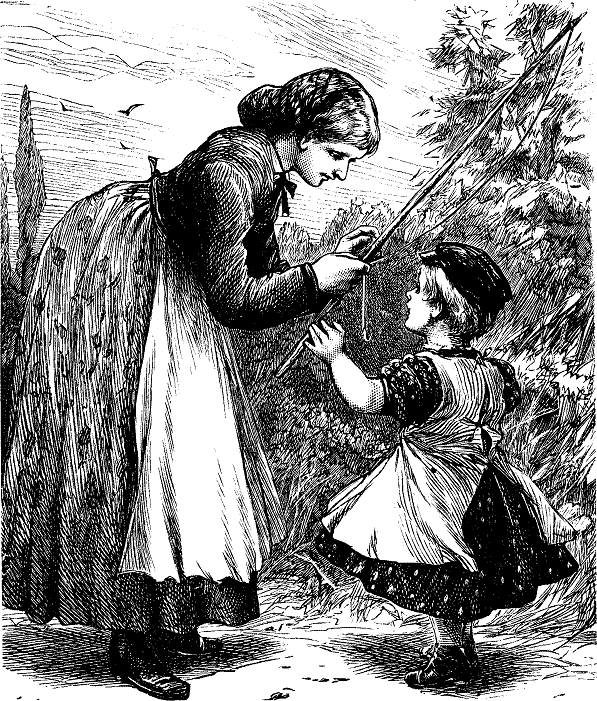
"Shall I fish for mackerel?
|
|
One day, as I was roaming through the thick wood, what should I see but a male deer, with branching horns, looking up at the blue sky! I crept back softly to our tent, and told Mr. Brisk what I had seen. He seized his gun. "What's that you say, Tom?" asked uncle Ralph. "Only this," said I; "there is a fine fat deer down by the brook; and, as we are all fond of venison, I think it's a good chance for Mr. Brisk to get a good shot at him." "Oh! that's it, is it?" said uncle Ralph, while his eyes flashed with mischief. "By all means let us kill the deer. Come, Brisk, where's your gun?" Mr. Brisk was looking at the barrels and the caps of his gun to see if all was right; then he said to uncle Ralph, "You and Tom had better stay here; for too many of us may startle the deer." "Go on," said uncle Ralph. "Be quick, or you will lose your chance." Mr. Brisk started for the brook, treading carefully, so as not to make a noise. No sooner was he gone than uncle Ralph seized me by the collar, and said, "Now, you young scapegrace, come along with me, and help me save the life of that deer." The old gentleman was in earnest. He could not bear to see life destroyed, whether of bird or beast. He lived on vegetables and fruits, and believed that the lower animals have souls. We took a by-path to the brook, and there found the deer quietly grazing. Just as Mr. Brisk was preparing to fire, uncle Ralph threw a stone at the deer, and sent him off on a fast gallop through the woods. "Hallo! What did you do that for?" asked Mr. Brisk. "I did it so that you should not have a venison dinner," said uncle Ralph, laughing. Mr. Brisk was pretty mad at first; but at last he joined in the laugh, and we all had a good feast on strawberries instead of Venison. |
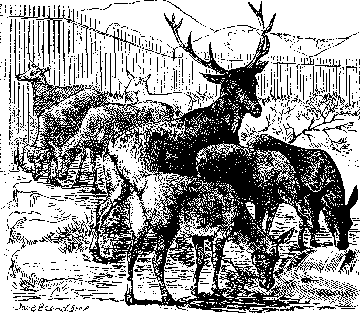
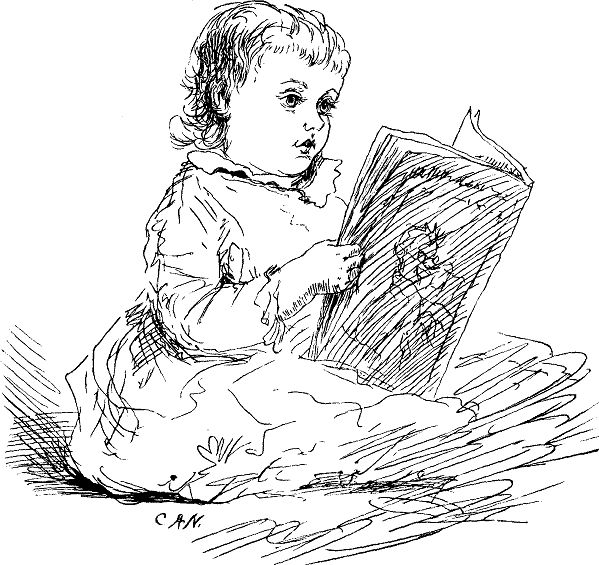
She is tired of her dolly, and tired of |

|
"Well, well, well!" said grandmamma, "Only to see the toys,— The marvels of skill and of beauty, That are made for these girls and boys!— Velocipedes, acrobats, barrows, And a dozen kinds of ball, And the beautiful bows and arrows, With quivers and belts and all; And dolls, with an outfit from Paris, With eyes that open and shut, With jewelry worth a small fortune, And six several bonnets,—tut, tut! "My goodness! If Polly and Rachel, Who played in old times with me, In the corner down by the smoke-house, These wonderful dolls could see! Rachel's doll had a round head whittled From a bit of soft pine wood; And Polly's was only a corn-cob, With a calico slip and hood. My doll was a lovely rag-baby, With badly-inked eyes and nose; Her cheeks were painted with cherry-juice; And I made every stitch of her clothes. "Nathan's bow was a pliant whalebone, And his arrow a white-pine stick; Such a life as his archery practice Led the cats and each wretched chick! Our tea-sets were bits of dishes That mother had thrown away, With chincapin saucers and acorn-cups; And our dolls slept on moss and hay. With a May-apple leaf for a parasol We played 'Lady-come-to-see,' Polly's house was the kitchen door-step, And mine was the apple-tree. "We never saw 'Germans' and 'Matinees,' And we played good romping plays; And, somehow, I think we were happier far Than the children are nowadays. Our swing was an old, wild grape-vine; We waded and climbed and ran, And never were weary, nor sick, nor 'bored' From the minute that day began. Well, well, well!" said grandmamma, "In spite of their wonderful toys, I do believe we had merrier times Than these little girls and boys!" |
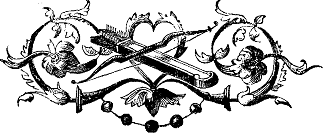
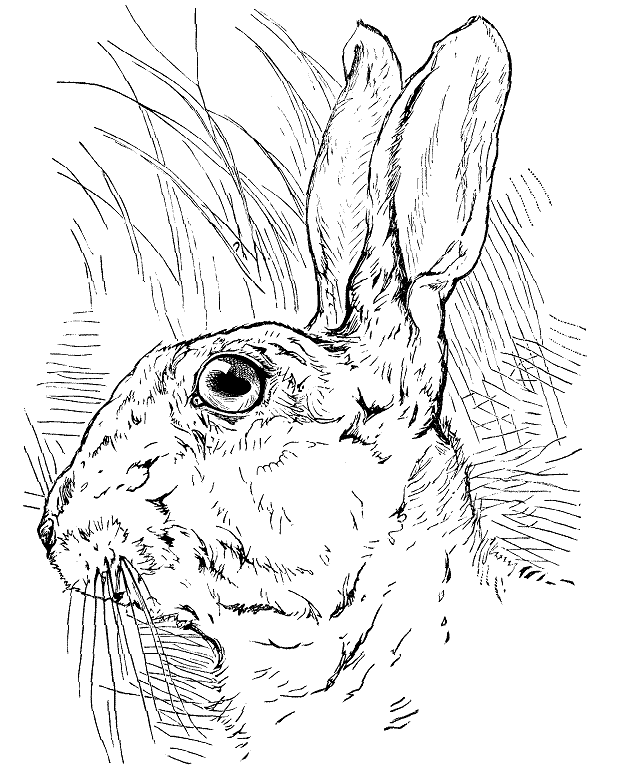
Amy Cooper lived in a little fishing-village, not far from the cliffs of Dover, in England. She was the daughter of a poor fisherman, who worked hard for his family. Mr. Cooper was such a good, kind man, that no one could help loving him. His children loved him dearly; and no one loved him quite so dearly as his daughter Amy.
She was a thoughtful little girl, and at the time of my story was twelve years old. She saw that her father's health was failing through hard work; and the one great thought in her mind was, "How can I help my dear father to earn money for us all?"
This was a hard question, and it was long before Amy could find an answer. But one day, with her aunt, she took a long walk to Dover. Here she saw a large hotel, and many well-clad persons in a pleasant park near by. It was on this visit to Dover that Amy formed a plan about which I am going to tell you.
Now it had happened three years before, that a poor young man of the name of Simpson had been saved from drowning by Amy's father. I fear that the young man had thrown himself into the water because he was sick of life, but I dare say he was glad enough to be pulled out.
Mr. Cooper took him home, gave him a room and a bed, and there Mr. Simpson staid for some time. He was what is called an artist. He had a great talent for drawing with a pen and ink. He taught Amy to do this. She soon did it so well, that he said to her, "Keep on trying, my dear, and it may be a great help to you by and by."
Sure enough she did keep on trying. Her one thought was to do so well that she could make money by her art. Poor Mr. Simpson died after he had staid with the honest fisherman two years; and his last words to Amy were, "Keep on practising, my dear: don't let a day pass without it. I am sure you will make an artist."
Amy had followed his advice; and now, when her father was ill, she resolved to see if she could not turn her art to account. She made twenty sketches with pen and ink. They were sketches of fishermen—drawn from life; and they were done with a spirit and skill that struck every one with surprise.
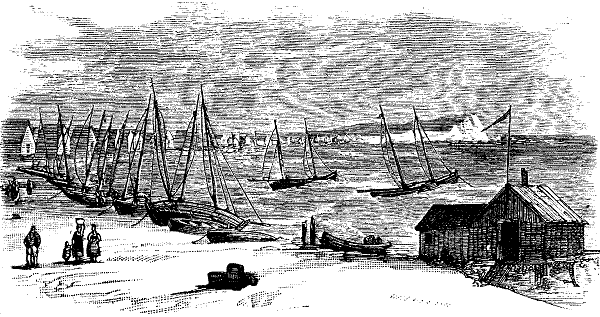
Taking the specimens with her, she went to Dover, and showed them to the ladies and gentlemen. At last one gentleman, a Mr. Ritson, who was rich, and fond of art, said to her, "Don't try to humbug me, little girl. You never did this work. Come in, and let me test you."
"Do it," said Amy, bravely and confidently.
He took her into the reading-room of the hotel, and in a few minutes she produced a likeness of Mr. Ritson, which made him cry out, "Bravo, bravo, little girl! You have done it! Forgive my suspicions. Here is a guinea for what you have done. Come here to-morrow at this time, and I will see what I can do to help you."
Amy, wild with joy, took the money home to her father. The prosperity of the family was now assured. Mr. Ritson proved to be a true friend. He showed Amy's sketches to a great many persons, and praised them so highly, that she soon began to have orders.
She continued to improve, and in time became quite a successful artist. She had as much work as she could do, and earned more in a month than her father could earn in a year. He soon got well, and lived to take great comfort in the fame of his dear little girl.
|
JOHNNY.
I want to go to school, |
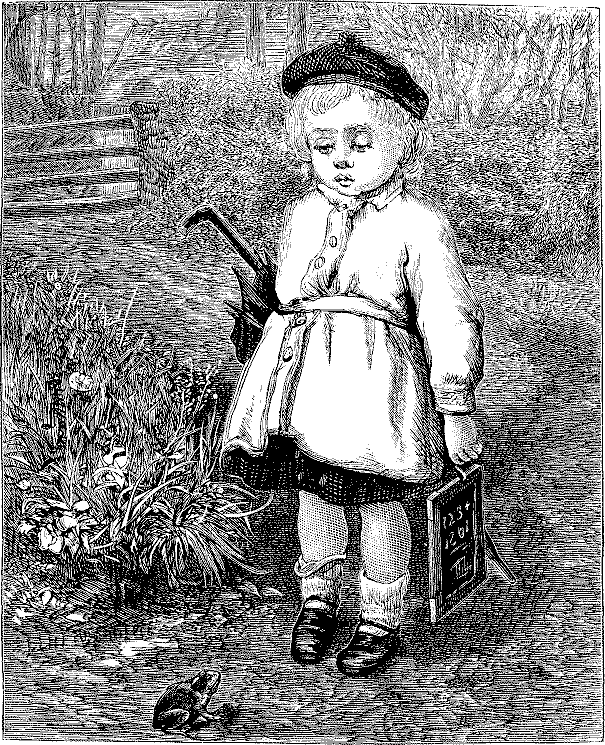
|
TOAD.
Here's a dreadful thing!— JOHNNY.
I must go to school, TOAD.
I must cross the path, |
|
A hop and a start, a flutter and a rush, Johnny is at school, and the toad in his bush. |
In a city not far from Boston, there once lived a stout little fellow named Willie Wilkins. He was six years old, had red cheeks and blue eyes, and such curly hair that it was always in a tumble, no matter how much it was brushed.
One summer his mamma took him into the country to spend a few weeks at a farm-house. The farmer's wife, Mrs. Hill, was very glad to have him come, for she had no girls or boys of her own, to make the house pleasant. She liked to see Willie running about, and hear his shrill voice calling after the great house-dog Bruno.
One morning Willie had been as busy as ever at his play: he had been in the orchard, hunting for ripe apples; he had been in the barn, looking for hen's eggs in the sweet hay; he had been down to the brook, sailing his boat; and he had played market-man, with Bruno harnessed for a horse.
After all this, the little boy was both tired and hungry: so he went back to the house, and sat down on the broad stone steps outside the kitchen-door to rest. Mrs. Hill was busy in the kitchen, frying doughnuts, and, when Willie saw what she was doing, he was more hungry than ever. The doughnuts looked very brown and nice; but Willie was too bashful to ask for one.
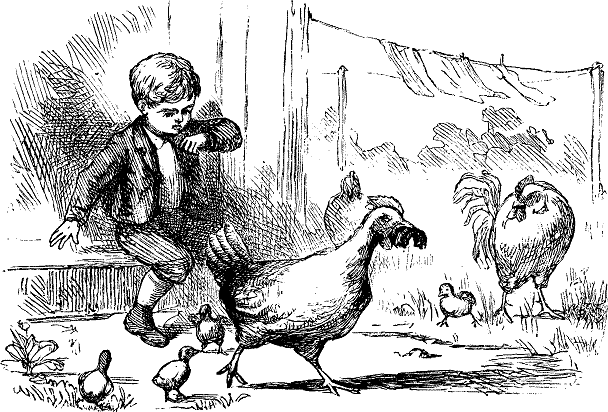
At last Mrs. Hill looked up, and, seeing Willie's blue eyes fixed upon her with such an eager gaze, she guessed at once what he wanted. She gave him a doughnut and a kiss, and he sat down on the doorstep with the doughnut in his hand. But he had hardly taken two bites of it, when a strange thing happened.
Some hens were scratching around in the yard to find food for themselves and their chickens. Now one old Biddy, who had a large family to provide for, and who was almost tired out with hunting for worms, looked at Willie's doughnut with a longing eye. She walked close up to the doorstep, arched her neck, and clucked, asking as plainly as she knew how for a piece of doughnut. But Willie was too busy even to look at her.
At last Biddy became impatient. As no notice was taken of her civil request, she made up her mind to take, without further asking, what Willie did not seem inclined to give. She was a little afraid to do it; but her chickens were teasing for more food, and she was determined to get enough for them.
So she stepped up beside Willie, snatched the doughnut out of his hand, and ran away with it as fast as she could. Her chickens ran after her, screaming for the fine feast which their mother had stolen for them.
And there sat Willie on the doorstep, his eyes bigger and bluer than ever, amazed to find himself robbed in this way by a respectable looking old hen. He did not know what to do, and was half inclined to cry.
But, when little children are in trouble, there is always one thing they can do: they can go to their mamma, and ask her help. Willie thought of this, and trotted off with a very sober face to tell his mamma this wonderful story of the hen who helped herself.

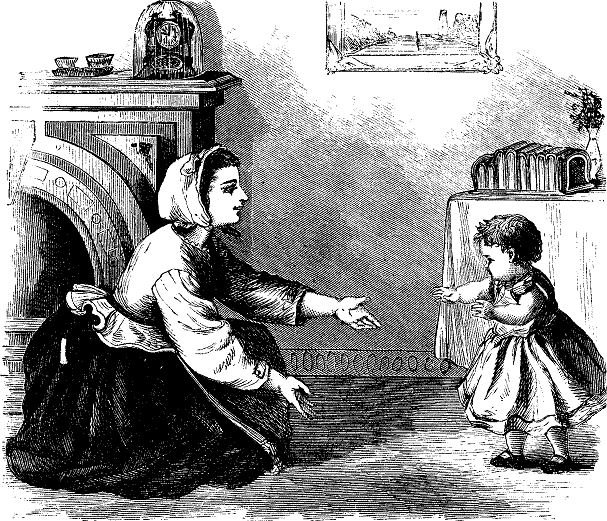
|
"Come, my baby, all alone!" Was so long a baby-journey ever known? All the way, so wide and bare, From the table to the chair; 'Tis no wonder he should linger, Holding on to papa's finger, Though his mother beckons there From her throne, With, "Come, baby, all alone!" "Come, my baby, all alone!" Were such mingled doubt and daring ever shown? Now he drops his hold, and then Closer clings to it again; Now he steps out with a shiver, As one tries a rapid river, And shrinks back, and wonders when, Taller grown, Baby shall go all alone. "Here comes baby, all alone!" Was a more victorious bravery ever known? Right across the trackless space The small feet have won their race; And he tosses back thereafter Such a peal of ringing laughter! It laughs out from every face, Proud to own "Baby has gone all alone!' Back goes baby all alone. Oh what inches, all at once, has baby grown! Back and forth, with merry cries, Like a little bird he flies; First to father, then to mother, Then to sister, then to brother, Greeting each with laughing eyes. Bravely done! Shout for baby, every one! |
| GEORGE S. BURLEIGH. |
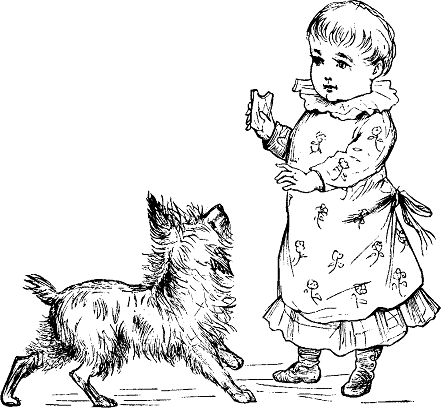
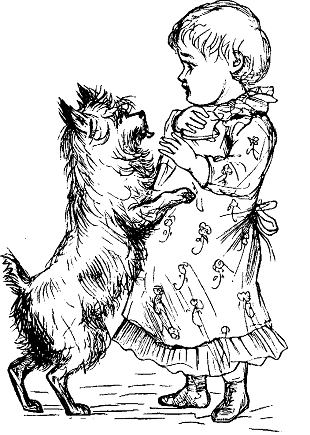
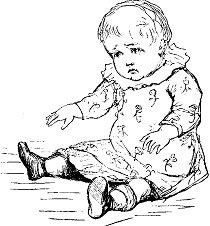

It was a splendid great kite, almost as tall as George himself. It was a birthday-gift from his grandfather.
George had never owned a kite before; and there never was a happier boy than he when he went out to fly it for the first time.
But he came back looking quite sad.
"Why, what is the matter my boy?" said his grandfather.
George held up his kite. There was a large hole in it. In trying to raise his kite, the little boy, being perhaps rather clumsy, had got it entangled in a tree. Its beauty was spoiled, and George had brought it home without having had the pleasure of seeing it up in the sky.
"Well, well," said his kind old grandfather, "we will have it mended and try it again. Better luck next time!"
Carlo, the dog, looked up, as much as to say, "If there is anything I can do for you, George, call on me."
But George's bright little sister Susan, without saying a word, ran into the house and brought a pot of paste and some paper. "I'll mend it for you, George," said she, "in three minutes."
And sure enough, she mended it so neatly that it was as good as new the next morning, and George took it out again with a face as merry as ever. He got it up in fine style this time, and had a grand time flying it.
It went up higher and pulled harder than any kite on the play-ground. Susan, who often went out with George to have a share of the fun, was hardly strong enough to hold it.
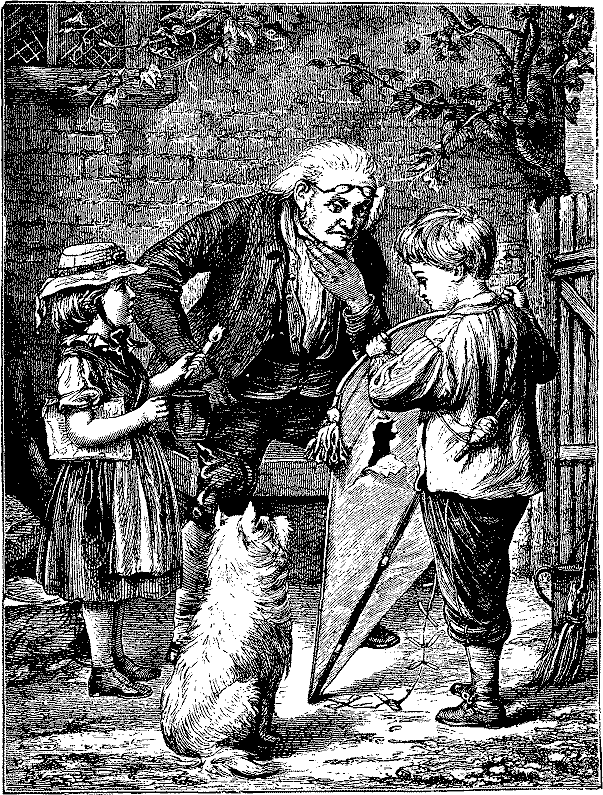
One day when Susan was trying to wind up the string, the stick slipped out of her hands, and away went the kite. George got it back after a hard chase, but it was torn to shreds. Susan now looked sad in her turn.
But George only laughed, and said, "Never mind, Susie. Bring out the old paste-pot again."
| Words by GEORGE COOPER. | Music by T. CRAMPTON. |
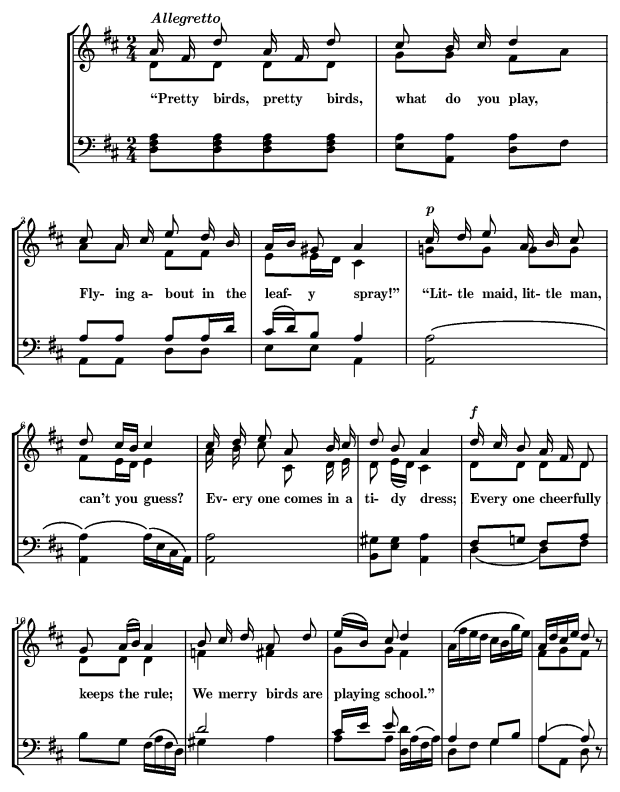
|
1. "Pretty birds, pretty birds, what do you play, |
|
A KEY THAT
WILL WIND ANY WATCH AND NOT WEAR OUT. SOLD by Watchmakers. By mail, 30 cts. Circulars FREE. J.S. BIRCH & CO., 38 Dey St., N.Y.
GREAT WESTERN GUN WORKS, Pittsburgh, Pa.
 Send stamp for Catalogue. Rifles, Shot Guns, Revolvers, sent c.o.d., for examination. ***Induce your neighbors and friends to Subscribe for "The Nursery" at once. |
Children Cry for Pitcher'sCASTORIAbecause it is sweet and stops their stomach ache. Mothers like Castoria because it gives health to the Child and rest to themselves, and Physicians use Castoria because it contains no morphine or other narcotic property. |
 |
PERSONAL.
Suffer from indigestion, |
|
52 Gold, Crystal, Lace, Perfumed, and Chromo Cards, name
in Gold and Jet, 10c. Clinton Bros., Clintonville, Conn.
50 Elegant New Chromos, Shells, Gold-border, &c. cards, name on 10c. G.A. Spring. Northford, Ct. A PRESENT. Beautiful Chrome Cards given to readers of this paper for 3c. stamp, C.B. Havens, Summit, N.Y. Subscribe for "The Nursery" now. |
HANFORD'S NONE SUCH BAKING POWDER. |
Is Absolutely Pure;—Grape Cream Tarter and Bicarb. Soda. Contains nothing else; full weight: forfeited if not as represented. All other kinds have filling. Sample of pure powder and test to detect filling free by mail. Geo. C. Hanford, Syracuse, N.Y. |
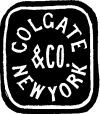 CASHMERE BOUQUET
TOILET SOAP.
CASHMERE BOUQUET
TOILET SOAP.The novelty and exceptional strength of its perfume are the peculiar fascinations of this luxurious article, which has acquired popularity unequaled by any Toilet Soap of home or foreign manufacture. |
INVALID ROLLING CHAIR.(RECLINING)

 A Priceless boon to those who are unable to walk. Hon. A.H. Stephens, M.C., and hundreds of others use them. Send for Circular to FOLDING CHAIR CO., New Haven, Conn. |
Please Show your copy of
to all your friends, and ask them to subscribe for it. See last page of cover. |
SUBSCRIPTIONS.—$1.50 a year, in advance. Two copies for $2.80 a year; three for $4.00; four for $5.00; five for $6.00; six for $7.00; seven for $8.00; eight for $9.00; nine for $10.00; each additional copy for $1.10, always in advance.
A Single Number will be mailed for 15 cents. One sample number will be mailed for 10 cents.
Volumes begin with January and July. Subscriptions may commence with any month, but, unless the time is specified, will date from the beginning of the current volume.
Back Numbers can always be supplied. THE MAGAZINE COMMENCED JANUARY, 1867.
Bound Volumes, each containing the numbers for six months, will be sent by mail, postpaid, for $1.00 per volume; yearly volumes for $1.75.
Covers, for half-yearly volume, postpaid, 35 cents; covers for yearly volume, 40 cents.
Prices of Binding.—In the regular half-yearly volume, 40 cents; in one yearly volume (12 Nos. in one), 50 cents. If the volumes are to be returned by mail, add 10 cents for the half-yearly, and 15 cents for the yearly volume, to pay postage.
Remittances should be made, if possible, by Bank-check or by Postal money-order. Currency by mail is at the risk of the sender. Postage Stamps may be used as currency.
|
|
N.B.—To obtain the benefit of the above rates, it must be distinctly understood that a copy of "THE NURSERY" should be ordered with each magazine clubbed with it. Both Magazines must be subscribed for at the same time; but they need not be to the same address. We furnish our own Magazine, and agree to pay the subscription for the other. Beyond this we take no responsibility. The publisher of each Magazine is responsible for its prompt delivery; and complaints must be addressed accordingly.
The number of the Magazine with which your subscription expires is indicated by the number annexed to the address on the printed label. When no such number appears, it will be understood that the subscription ends with the current year. No notice of discontinuance need be given, as the Magazine is never sent after the term of subscription expires. Subscribers will oblige us by sending their renewals promptly. State always that your payment is for a renewal, when such is the fact. In changing the direction, the old as well as the new address should be given. The sending of "THE NURSERY" will be regarded as a sufficient receipt. Any one not receiving it will please notify us immediately, giving date of remittance. ADDRESS
| 36 Bromfield Street, Boston, Mass. |
End of the Project Gutenberg EBook of The Nursery, Number 164, by Various
*** END OF THIS PROJECT GUTENBERG EBOOK THE NURSERY, NUMBER 164 ***
***** This file should be named 15928-h.htm or 15928-h.zip *****
This and all associated files of various formats will be found in:
https://www.gutenberg.org/1/5/9/2/15928/
Produced by Juliet Sutherland, Bruce Thomas and the Online
Distributed Proofreading Team.
Updated editions will replace the previous one--the old editions
will be renamed.
Creating the works from public domain print editions means that no
one owns a United States copyright in these works, so the Foundation
(and you!) can copy and distribute it in the United States without
permission and without paying copyright royalties. Special rules,
set forth in the General Terms of Use part of this license, apply to
copying and distributing Project Gutenberg-tm electronic works to
protect the PROJECT GUTENBERG-tm concept and trademark. Project
Gutenberg is a registered trademark, and may not be used if you
charge for the eBooks, unless you receive specific permission. If you
do not charge anything for copies of this eBook, complying with the
rules is very easy. You may use this eBook for nearly any purpose
such as creation of derivative works, reports, performances and
research. They may be modified and printed and given away--you may do
practically ANYTHING with public domain eBooks. Redistribution is
subject to the trademark license, especially commercial
redistribution.
*** START: FULL LICENSE ***
THE FULL PROJECT GUTENBERG LICENSE
PLEASE READ THIS BEFORE YOU DISTRIBUTE OR USE THIS WORK
To protect the Project Gutenberg-tm mission of promoting the free
distribution of electronic works, by using or distributing this work
(or any other work associated in any way with the phrase "Project
Gutenberg"), you agree to comply with all the terms of the Full Project
Gutenberg-tm License (available with this file or online at
https://gutenberg.org/license).
Section 1. General Terms of Use and Redistributing Project Gutenberg-tm
electronic works
1.A. By reading or using any part of this Project Gutenberg-tm
electronic work, you indicate that you have read, understand, agree to
and accept all the terms of this license and intellectual property
(trademark/copyright) agreement. If you do not agree to abide by all
the terms of this agreement, you must cease using and return or destroy
all copies of Project Gutenberg-tm electronic works in your possession.
If you paid a fee for obtaining a copy of or access to a Project
Gutenberg-tm electronic work and you do not agree to be bound by the
terms of this agreement, you may obtain a refund from the person or
entity to whom you paid the fee as set forth in paragraph 1.E.8.
1.B. "Project Gutenberg" is a registered trademark. It may only be
used on or associated in any way with an electronic work by people who
agree to be bound by the terms of this agreement. There are a few
things that you can do with most Project Gutenberg-tm electronic works
even without complying with the full terms of this agreement. See
paragraph 1.C below. There are a lot of things you can do with Project
Gutenberg-tm electronic works if you follow the terms of this agreement
and help preserve free future access to Project Gutenberg-tm electronic
works. See paragraph 1.E below.
1.C. The Project Gutenberg Literary Archive Foundation ("the Foundation"
or PGLAF), owns a compilation copyright in the collection of Project
Gutenberg-tm electronic works. Nearly all the individual works in the
collection are in the public domain in the United States. If an
individual work is in the public domain in the United States and you are
located in the United States, we do not claim a right to prevent you from
copying, distributing, performing, displaying or creating derivative
works based on the work as long as all references to Project Gutenberg
are removed. Of course, we hope that you will support the Project
Gutenberg-tm mission of promoting free access to electronic works by
freely sharing Project Gutenberg-tm works in compliance with the terms of
this agreement for keeping the Project Gutenberg-tm name associated with
the work. You can easily comply with the terms of this agreement by
keeping this work in the same format with its attached full Project
Gutenberg-tm License when you share it without charge with others.
1.D. The copyright laws of the place where you are located also govern
what you can do with this work. Copyright laws in most countries are in
a constant state of change. If you are outside the United States, check
the laws of your country in addition to the terms of this agreement
before downloading, copying, displaying, performing, distributing or
creating derivative works based on this work or any other Project
Gutenberg-tm work. The Foundation makes no representations concerning
the copyright status of any work in any country outside the United
States.
1.E. Unless you have removed all references to Project Gutenberg:
1.E.1. The following sentence, with active links to, or other immediate
access to, the full Project Gutenberg-tm License must appear prominently
whenever any copy of a Project Gutenberg-tm work (any work on which the
phrase "Project Gutenberg" appears, or with which the phrase "Project
Gutenberg" is associated) is accessed, displayed, performed, viewed,
copied or distributed:
This eBook is for the use of anyone anywhere at no cost and with
almost no restrictions whatsoever. You may copy it, give it away or
re-use it under the terms of the Project Gutenberg License included
with this eBook or online at www.gutenberg.org
1.E.2. If an individual Project Gutenberg-tm electronic work is derived
from the public domain (does not contain a notice indicating that it is
posted with permission of the copyright holder), the work can be copied
and distributed to anyone in the United States without paying any fees
or charges. If you are redistributing or providing access to a work
with the phrase "Project Gutenberg" associated with or appearing on the
work, you must comply either with the requirements of paragraphs 1.E.1
through 1.E.7 or obtain permission for the use of the work and the
Project Gutenberg-tm trademark as set forth in paragraphs 1.E.8 or
1.E.9.
1.E.3. If an individual Project Gutenberg-tm electronic work is posted
with the permission of the copyright holder, your use and distribution
must comply with both paragraphs 1.E.1 through 1.E.7 and any additional
terms imposed by the copyright holder. Additional terms will be linked
to the Project Gutenberg-tm License for all works posted with the
permission of the copyright holder found at the beginning of this work.
1.E.4. Do not unlink or detach or remove the full Project Gutenberg-tm
License terms from this work, or any files containing a part of this
work or any other work associated with Project Gutenberg-tm.
1.E.5. Do not copy, display, perform, distribute or redistribute this
electronic work, or any part of this electronic work, without
prominently displaying the sentence set forth in paragraph 1.E.1 with
active links or immediate access to the full terms of the Project
Gutenberg-tm License.
1.E.6. You may convert to and distribute this work in any binary,
compressed, marked up, nonproprietary or proprietary form, including any
word processing or hypertext form. However, if you provide access to or
distribute copies of a Project Gutenberg-tm work in a format other than
"Plain Vanilla ASCII" or other format used in the official version
posted on the official Project Gutenberg-tm web site (www.gutenberg.org),
you must, at no additional cost, fee or expense to the user, provide a
copy, a means of exporting a copy, or a means of obtaining a copy upon
request, of the work in its original "Plain Vanilla ASCII" or other
form. Any alternate format must include the full Project Gutenberg-tm
License as specified in paragraph 1.E.1.
1.E.7. Do not charge a fee for access to, viewing, displaying,
performing, copying or distributing any Project Gutenberg-tm works
unless you comply with paragraph 1.E.8 or 1.E.9.
1.E.8. You may charge a reasonable fee for copies of or providing
access to or distributing Project Gutenberg-tm electronic works provided
that
- You pay a royalty fee of 20% of the gross profits you derive from
the use of Project Gutenberg-tm works calculated using the method
you already use to calculate your applicable taxes. The fee is
owed to the owner of the Project Gutenberg-tm trademark, but he
has agreed to donate royalties under this paragraph to the
Project Gutenberg Literary Archive Foundation. Royalty payments
must be paid within 60 days following each date on which you
prepare (or are legally required to prepare) your periodic tax
returns. Royalty payments should be clearly marked as such and
sent to the Project Gutenberg Literary Archive Foundation at the
address specified in Section 4, "Information about donations to
the Project Gutenberg Literary Archive Foundation."
- You provide a full refund of any money paid by a user who notifies
you in writing (or by e-mail) within 30 days of receipt that s/he
does not agree to the terms of the full Project Gutenberg-tm
License. You must require such a user to return or
destroy all copies of the works possessed in a physical medium
and discontinue all use of and all access to other copies of
Project Gutenberg-tm works.
- You provide, in accordance with paragraph 1.F.3, a full refund of any
money paid for a work or a replacement copy, if a defect in the
electronic work is discovered and reported to you within 90 days
of receipt of the work.
- You comply with all other terms of this agreement for free
distribution of Project Gutenberg-tm works.
1.E.9. If you wish to charge a fee or distribute a Project Gutenberg-tm
electronic work or group of works on different terms than are set
forth in this agreement, you must obtain permission in writing from
both the Project Gutenberg Literary Archive Foundation and Michael
Hart, the owner of the Project Gutenberg-tm trademark. Contact the
Foundation as set forth in Section 3 below.
1.F.
1.F.1. Project Gutenberg volunteers and employees expend considerable
effort to identify, do copyright research on, transcribe and proofread
public domain works in creating the Project Gutenberg-tm
collection. Despite these efforts, Project Gutenberg-tm electronic
works, and the medium on which they may be stored, may contain
"Defects," such as, but not limited to, incomplete, inaccurate or
corrupt data, transcription errors, a copyright or other intellectual
property infringement, a defective or damaged disk or other medium, a
computer virus, or computer codes that damage or cannot be read by
your equipment.
1.F.2. LIMITED WARRANTY, DISCLAIMER OF DAMAGES - Except for the "Right
of Replacement or Refund" described in paragraph 1.F.3, the Project
Gutenberg Literary Archive Foundation, the owner of the Project
Gutenberg-tm trademark, and any other party distributing a Project
Gutenberg-tm electronic work under this agreement, disclaim all
liability to you for damages, costs and expenses, including legal
fees. YOU AGREE THAT YOU HAVE NO REMEDIES FOR NEGLIGENCE, STRICT
LIABILITY, BREACH OF WARRANTY OR BREACH OF CONTRACT EXCEPT THOSE
PROVIDED IN PARAGRAPH F3. YOU AGREE THAT THE FOUNDATION, THE
TRADEMARK OWNER, AND ANY DISTRIBUTOR UNDER THIS AGREEMENT WILL NOT BE
LIABLE TO YOU FOR ACTUAL, DIRECT, INDIRECT, CONSEQUENTIAL, PUNITIVE OR
INCIDENTAL DAMAGES EVEN IF YOU GIVE NOTICE OF THE POSSIBILITY OF SUCH
DAMAGE.
1.F.3. LIMITED RIGHT OF REPLACEMENT OR REFUND - If you discover a
defect in this electronic work within 90 days of receiving it, you can
receive a refund of the money (if any) you paid for it by sending a
written explanation to the person you received the work from. If you
received the work on a physical medium, you must return the medium with
your written explanation. The person or entity that provided you with
the defective work may elect to provide a replacement copy in lieu of a
refund. If you received the work electronically, the person or entity
providing it to you may choose to give you a second opportunity to
receive the work electronically in lieu of a refund. If the second copy
is also defective, you may demand a refund in writing without further
opportunities to fix the problem.
1.F.4. Except for the limited right of replacement or refund set forth
in paragraph 1.F.3, this work is provided to you 'AS-IS' WITH NO OTHER
WARRANTIES OF ANY KIND, EXPRESS OR IMPLIED, INCLUDING BUT NOT LIMITED TO
WARRANTIES OF MERCHANTIBILITY OR FITNESS FOR ANY PURPOSE.
1.F.5. Some states do not allow disclaimers of certain implied
warranties or the exclusion or limitation of certain types of damages.
If any disclaimer or limitation set forth in this agreement violates the
law of the state applicable to this agreement, the agreement shall be
interpreted to make the maximum disclaimer or limitation permitted by
the applicable state law. The invalidity or unenforceability of any
provision of this agreement shall not void the remaining provisions.
1.F.6. INDEMNITY - You agree to indemnify and hold the Foundation, the
trademark owner, any agent or employee of the Foundation, anyone
providing copies of Project Gutenberg-tm electronic works in accordance
with this agreement, and any volunteers associated with the production,
promotion and distribution of Project Gutenberg-tm electronic works,
harmless from all liability, costs and expenses, including legal fees,
that arise directly or indirectly from any of the following which you do
or cause to occur: (a) distribution of this or any Project Gutenberg-tm
work, (b) alteration, modification, or additions or deletions to any
Project Gutenberg-tm work, and (c) any Defect you cause.
Section 2. Information about the Mission of Project Gutenberg-tm
Project Gutenberg-tm is synonymous with the free distribution of
electronic works in formats readable by the widest variety of computers
including obsolete, old, middle-aged and new computers. It exists
because of the efforts of hundreds of volunteers and donations from
people in all walks of life.
Volunteers and financial support to provide volunteers with the
assistance they need, is critical to reaching Project Gutenberg-tm's
goals and ensuring that the Project Gutenberg-tm collection will
remain freely available for generations to come. In 2001, the Project
Gutenberg Literary Archive Foundation was created to provide a secure
and permanent future for Project Gutenberg-tm and future generations.
To learn more about the Project Gutenberg Literary Archive Foundation
and how your efforts and donations can help, see Sections 3 and 4
and the Foundation web page at https://www.pglaf.org.
Section 3. Information about the Project Gutenberg Literary Archive
Foundation
The Project Gutenberg Literary Archive Foundation is a non profit
501(c)(3) educational corporation organized under the laws of the
state of Mississippi and granted tax exempt status by the Internal
Revenue Service. The Foundation's EIN or federal tax identification
number is 64-6221541. Its 501(c)(3) letter is posted at
https://pglaf.org/fundraising. Contributions to the Project Gutenberg
Literary Archive Foundation are tax deductible to the full extent
permitted by U.S. federal laws and your state's laws.
The Foundation's principal office is located at 4557 Melan Dr. S.
Fairbanks, AK, 99712., but its volunteers and employees are scattered
throughout numerous locations. Its business office is located at
809 North 1500 West, Salt Lake City, UT 84116, (801) 596-1887, email
business@pglaf.org. Email contact links and up to date contact
information can be found at the Foundation's web site and official
page at https://pglaf.org
For additional contact information:
Dr. Gregory B. Newby
Chief Executive and Director
gbnewby@pglaf.org
Section 4. Information about Donations to the Project Gutenberg
Literary Archive Foundation
Project Gutenberg-tm depends upon and cannot survive without wide
spread public support and donations to carry out its mission of
increasing the number of public domain and licensed works that can be
freely distributed in machine readable form accessible by the widest
array of equipment including outdated equipment. Many small donations
($1 to $5,000) are particularly important to maintaining tax exempt
status with the IRS.
The Foundation is committed to complying with the laws regulating
charities and charitable donations in all 50 states of the United
States. Compliance requirements are not uniform and it takes a
considerable effort, much paperwork and many fees to meet and keep up
with these requirements. We do not solicit donations in locations
where we have not received written confirmation of compliance. To
SEND DONATIONS or determine the status of compliance for any
particular state visit https://pglaf.org
While we cannot and do not solicit contributions from states where we
have not met the solicitation requirements, we know of no prohibition
against accepting unsolicited donations from donors in such states who
approach us with offers to donate.
International donations are gratefully accepted, but we cannot make
any statements concerning tax treatment of donations received from
outside the United States. U.S. laws alone swamp our small staff.
Please check the Project Gutenberg Web pages for current donation
methods and addresses. Donations are accepted in a number of other
ways including including checks, online payments and credit card
donations. To donate, please visit: https://pglaf.org/donate
Section 5. General Information About Project Gutenberg-tm electronic
works.
Professor Michael S. Hart was the originator of the Project Gutenberg-tm
concept of a library of electronic works that could be freely shared
with anyone. For thirty years, he produced and distributed Project
Gutenberg-tm eBooks with only a loose network of volunteer support.
Project Gutenberg-tm eBooks are often created from several printed
editions, all of which are confirmed as Public Domain in the U.S.
unless a copyright notice is included. Thus, we do not necessarily
keep eBooks in compliance with any particular paper edition.
Most people start at our Web site which has the main PG search facility:
https://www.gutenberg.org
This Web site includes information about Project Gutenberg-tm,
including how to make donations to the Project Gutenberg Literary
Archive Foundation, how to help produce our new eBooks, and how to
subscribe to our email newsletter to hear about new eBooks.